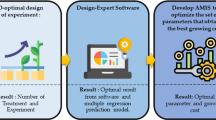Abstract
This paper focuses on the problem of choosing one among many alternatives, each one expressed as a combination of factors. The problem is approached with a reasoning-based strategy that takes into account the relations among the alternatives discovered by means of a data mining technique. The problem of choosing a combination of different vegetables based on the synergistic effects of the combination and considering some socioeconomic variables is taken as a case study. The idea is to identify combinations that lead to gains in productivity, profitability, and lower costs. Experts recognize that some combinations of cultures can generate synergistic effects that can lead to profits or losses, depending on the production variables involved. However, the analysis of the results of the cultivation of multiple varieties involves a space of possibilities whose treatment is not trivial. Among the alternatives available, this study explored the Combinatorial Neural Model (CNM) that assures the hypotheses generation for all possible combinations, within limits defined by the model parameters. The study was carried out on data collected from farms in the Brazilian Federal District. Two approaches to the problem are presented: (i) the first one based on univariate and bi-dimensional data analysis and (ii) a multidimensional analysis based on the CNM results.
Access this chapter
Tax calculation will be finalised at checkout
Purchases are for personal use only
Preview
Unable to display preview. Download preview PDF.
Similar content being viewed by others
References
Beckenkamp, F.G., Pree, W., Feldens, M.A.: Optimizations of the Combinatorial Neural Model. In: Proceedings of the 5th Brazilian Symposium on Neural Networks, p. 49 (1998)
Feldens, M.A., Castilho, J.M.V.: Data Mining with the Combinatorial Rule Model: An Application in a Health-Care Relational Database. In: Proceedings of the XXIII Latin-American Conference on Informatics (CLEI), Valparaiso, Chile (1997)
Haykin, S.: Neural Networks: A Comprehensive Foundation. Prentice-Hall, Englewood Cliffs (1999)
Machado, R.J., Rocha, A.F.: Handling knowledge in high order neural networks: the combinatorial neural network. IBM Rio Scientific Center, Brazil (1989) (Technical Report CCR076)
Machado, R.J., Rocha, A.F.: The combinatorial neural network: a connectionist model for knowledge based systems. In: Bouchon-Meunier, B., Zadeh, L.A., Yager, R.R. (eds.) IPMU 1990. LNCS, vol. 521, pp. 578–587. Springer, Heidelberg (1991)
Machado, R.J., Carneiro, W., Neves, P.A.: Learning in the combinatorial neural model. IEEE Transactions on Neural Networks 9, 831–847 (1998)
Noivo, R., Prado, H.A., Ladeira, M.: Yet Another Optimization of the Combinatorial Neural Model. In: Proceedings of the XXX Latin-American Conference on Informatics (CLEI), Arequipa, Chile, pp. 706–711 (2004)
Prado, H.A., Frigeri, S.R., Engel, P.M.: A Parsimonious Generation of Combinatorial Neural Model. In: IV Argentine Congress on Computer Science (CACIC 1998), Neuquén, Argentina (1998)
Prado, H.A., Machado, K.F., Frigeri, S.R., Engel, P.M.: Accuracy Tuning on Combinatorial Neural Model. In: Zhong, N., Zhou, L. (eds.) PAKDD 1999. LNCS (LNAI), vol. 1574, pp. 247–251. Springer, Heidelberg (1999)
Prado, H.A., Machado, K.F., Engel, P.M.: Alleviating the complexity of the Combinatorial Neural Model using a committee machine. In: Proceedings of the International Conference on Data Mining. WIT Press, Cambridge (2000)
Author information
Authors and Affiliations
Editor information
Editors and Affiliations
Rights and permissions
Copyright information
© 2010 Springer-Verlag Berlin Heidelberg
About this paper
Cite this paper
do Prado, H.A., Ferneda, E., de Faria, R.C. (2010). A Reasoning-Based Strategy for Exploring the Synergy among Alternative Crops. In: Setchi, R., Jordanov, I., Howlett, R.J., Jain, L.C. (eds) Knowledge-Based and Intelligent Information and Engineering Systems. KES 2010. Lecture Notes in Computer Science(), vol 6278. Springer, Berlin, Heidelberg. https://doi.org/10.1007/978-3-642-15393-8_20
Download citation
DOI: https://doi.org/10.1007/978-3-642-15393-8_20
Publisher Name: Springer, Berlin, Heidelberg
Print ISBN: 978-3-642-15392-1
Online ISBN: 978-3-642-15393-8
eBook Packages: Computer ScienceComputer Science (R0)




